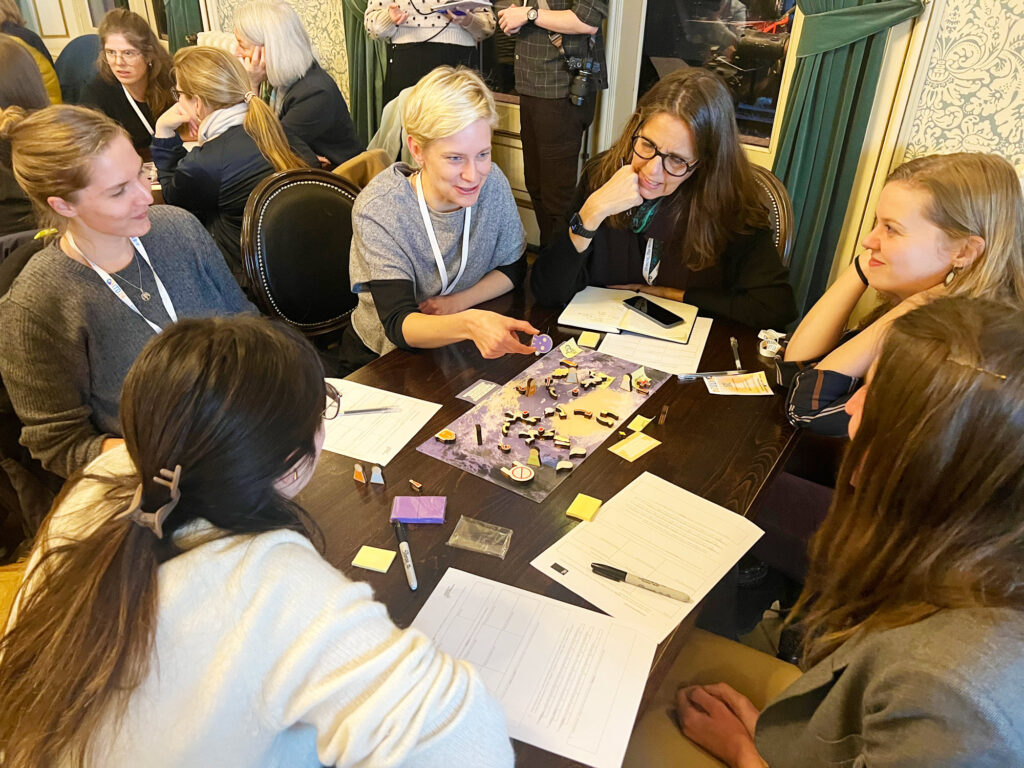CUCo’s Unbox team recently trialled Unbox at the ITD 24 conference in Utrecht. Unbox is a game-like tangible toolkit using metaphorical spaces (caves, islands, outer space, and so on) which participants can use to explore together how they might collaborate or re-imagine projects. CUCo spoke with Dan Lockton and Federico Andreotti about the team’s experience at ITD.
About Unbox
We often use metaphors when talking about collaboration in projects—‘milestones’, ‘building blocks’, ‘goals’, ‘horizons’, ‘work packages’, ‘missions’ and so on, just as we use ‘fields’ and ‘areas’ to discuss disciplines or types of work. Indeed, the word ‘project’ itself hides a metaphor: the Latin proicere, to throw forward. Metaphors can be a way to bridge disciplinary boundaries, assumptions, and worldviews, grow the capacity for inter- and transdisciplinarity, and (hopefully) ensure people from different backgrounds are ‘on the same page’, a form of shared vocabulary. But metaphors can trap us in particular ways of thinking and working, reproducing assumptions and structures. New metaphors can help us imagine different forms of collaborations and project—and making them tangible through physical objects and playful activities can make the group process even more engaging.
The Unbox team consists of Jonas Torrens (UU), Jillian Student (WUR), Federico Andreotti (WUR), Dan Lockton (TU/e / Imaginaries Lab), Merijn Buijnes (UU), Kuangyi Xing (independent), and Niva van de Geer (Flatland), and was recently joined by Niki Puskás (UU) and Gabriele Ferri (TU/e).
Why was it important to join the ITD conference with this session?
ITD was a great opportunity for a ‘playtest’ of our Unbox prototypes with participants who are already working in interdisciplinary and transdisciplinary spaces—and hence would be experienced in putting together and facilitating collaborations, aware of the issues, and potentially future users themselves of the Unbox approach. While we have developed Unbox with a research project framing, we ourselves (as with many of the ITD participants) are heavily involved in education too, and see its value there too.

What were the key takeaways for participants / for you as a team?
For participants, we hope that trying out Unbox was inspiring in terms of how new metaphors within collaborations could lead to more imaginative forms of project. Even if the specifics of the activity were different to their day-to-day work, aspects of the methods and the kinds of thinking it can inspire could be something they adopt and adapt. For us as a team, we learned a lot about how people make sense of and use the kit, what it does for them, and how we can refine the activity itself and how to facilitate it. Interesting patterns emerged around the kinds of metaphors people created, how they interpreted the ‘quests’ we gave them, and giving us pointers for the next stages of our project.
What insights emerged from the survey you took among participants?
During the workshop, participants described individually how they were feeling during our session. One participant stated that at the beginning of the workshop they were feeling frustration, especially looking at current academic collaborations, but after that felt empathy towards other peoples’ perspectives, and after that felt excitement about discovering new themes and topics.
We also asked about the most relevant metaphors, and the objects used to explain/share participants’ metaphors. One participant shared the metaphor of “Uncharted territory” as a metaphor to explain discovery, rather than colonization of the territories. The participants used a map of the sea and a boat as objects to convey this metaphor. The same group of participants used these objects when they worked with the metaphor of “Wind and the waves”, as symbols of power representing potential constraints, but also opportunities.
Overall, most of the participants agreed that the metaphors and quests used/played reflected challenges and opportunities in real-life collaborations.
What would be your invitation to future participants using the Unbox?
Later during 2025 we hope to be able to invite CUCo Spark/UCo teams—or anyone else from the EWUU community and beyond—to try out the next iteration Unbox as it develops further. If you have an idea for how your team could make use of Unbox, or would like to discuss possibilities, please get in touch with Jonas Torrens (j.colenladeiatorrens@uu.nl) at the Copernicus Institute for Sustainable Development, Utrecht University.